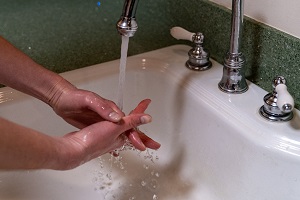
The COVID-19 pandemic has highlighted access to water and sanitation as the first line of defence, enabling people to frequently wash their hands in line with good hygiene practices. Governments must take all efforts to ensure equitable access, especially for vulnerable groups (people living in informal settlements, homeless persons, prisoners, older populations, people with disabilities, migrants, refugees, low-income populations, etc.).
The Water Convention serviced by UNECE and the Protocol on Water and Health jointly serviced by UNECE and WHO-Europe support countries in securing timely and sufficient availability of water of adequate quality and in providing safe water, sanitation and adequate hygiene - within countries and across borders and sectors.
Parties to the Protocol have the legal obligation to provide access to safe water for “all members of the population, especially those who suffer a disadvantage or social exclusion”. For the past 10 years, the Protocol has been supporting countries in ensuring equitable access to water and sanitation.
So far, the Protocol has supported 12 developed and developing countries in assessing equity gaps in access to water and sanitation. Many of them have taken concrete actions to address these challenges. The recent publication The Human Rights to Water and Sanitation in Practice: Findings and lessons learned from the work on equitable access to water and sanitation under the Protocol on Water and Health in the pan-European region features their experiences.
For instance, Armenia is currently revising its water code to integrate the concept of equity and vulnerable and marginalized groups. In France, action was taken on social pricing of water in some municipalities (taking into account household income, providing financial aid) to address affordability concerns in access to water and sanitation. In Hungary, an amendment of the National Building Code was adopted to reflect the minimum requirements for water and sanitation in its habitation standards. In North Macedonia, public toilets were reconstructed in Skopje and opened for free public use, offering water and sanitation access to vulnerable groups such as the homeless.
Through specific guidance tools, such as equitable access scorecard and guidance on developing equitable access plans, the Protocol supports countries to adopt an equity lens in their water, sanitation and hygiene governance and policy framework.
Water management must be sustainably planned at the basin level from the outset to secure availability of safe water resources. With sixty per cent of global freshwater flow coming from transboundary basins, the peaceful and cooperative management of these resources plays a crucial role to prevent potential tensions between countries as well as transboundary pollution.
The Convention on the Protection and Use of Transboundary Watercourses and International Lakes (Water Convention) offers a unique global framework to create the enabling conditions needed to implement integrated water resources management at basin level. In addition to its specific provisions on early warning across borders, joint monitoring and assessment, mutual assistance etc., a number of activities developed under the Water Convention can support countries in recovery and prevention of epidemics such as COVID-19.
For instance, activities supporting transboundary water cooperation (e.g. development or strengthening of transboundary water agreements and joint institutions) can help in coordinating and supporting actions by riparian countries for COVID-19 recovery and prevention of future crisis. Two activities in 2020–2021 support this area of work: the development of a Checklist for developing transboundary agreements and the development of a Handbook on water allocation in transboundary context.
Capacity building activities organized at the global level and support provided to specific basins in development and implementation of transboundary adaptation strategies and plans can help to promote better resilience by addressing the projected variety in water resources quantity and quality and increasing linkages between transboundary water cooperation, climate change adaptation and disaster risk reduction. A dedicated workshop on water, climate change, health and disasters is planned on 1-2 October 2020.
More information on the role of the Water Convention and the Protocol on Water and Health with regards to COVID-19: https://www.unece.org/environmental-policy/conventions/water/envwater/covid-19-the-role-of-the-water-convention-and-the-protocol-on-water-and-health.html

